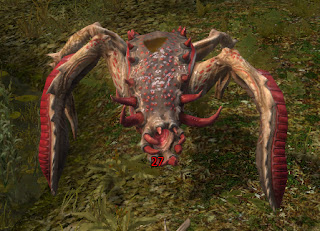 |
| Djinn Witch (Edea - Final Fantasy XIII) |
Purpose: Witches are neither good nor evil, though they do generally abide by the Rule of Three ("What you put out in the world shall be returned to you threefold") and that tends to mean that some witches can be quite vengeaful. Especially those that don't subscribe to the law: "Do as thou wilt but harm none", or at least modify that law to be "Do as thou wilt but harm none unless they have harmed you first". There are few witches who are true pacifists, however, and most believe strongly in self-defence even if they won't commit to pure vengeance.
A witch is more of a state of being than a career. Parents can teach their children the Way but people can also find their own way. Some individuals simply come into their powers at puberty or beforehand, having always looked at the world in a different way. Therefore, while witches might be the village wisewoman, city sorcerer or powerful autocraft, they are equally likely to be farmers, midwives, servants, entertainers and milkmaids. Ironically enough, most witches find their magic comes so naturally to them that they are more no more prone to forcefully using magic to get their own way than a fighter is prone to punch their way to a promotion. Sure, it happens, but it's not particularly common and most witches are therefore nicely ensconsed in their societies rather than living on the outskirts.
Blessings of the Moon
Illusory Disguise: All witches have a minor talent at illusions and while their skill isn't necessarily enough to cover their entire appearance it does provide a +3 bonus to all disguise rolls, whether mundane or magical, when the witch spends time trying to make themselves appear different. Changeling Mirrorskin Kith: core rulebook page 106.
Moon Madness: A witch has many abilities to protect themselves aond one such manner is to touch the vein of madness within us all. Once a day, the witch may spend a point of glamour and touch a person, rolling Intelligence + Wyrd versus the target's Resolve + Wyrd. The witch is guaranteed to take a temporary mild derangement while the target may take a temporary severe derangement only if they fail the resisted roll. While the witch can't specifically choose the derangement, it will be something beneficial to the situation. A witch that needs to escape a person won't make themselves dependent and their enemy fixated, after all, even on a subconscious level. Changeling Moonborn Kith: Winter Masques page 71.
Mystical Allure: There is a convenient side effect to a witch's innate mysticism and that is how it can imbue them with a level of attraction not normally present. Witches can spend a point of glamour to gain a +1 bonus to social rolls with those who might be interested in them as a lover and they gain the Striking Looks 4 merit as their innate magic flushes their eyes and smooths out the imperfections in their flesh. If the witch already has the Striking Looks 4 merit, she is treated as though having Striking Looks 6 though she also appears more obviously imbued with magic. The Striking Looks 6 witch isn't so attractive as to literally stun onlookers but it does ensure that no one can be more striking than them in the room. This lasts for a scene. Changeling Illes Kith: Winter Masques page 107.
Innate Mysticism: Witches can spend a point of glamour to gain the ability to smell enchantments and hexes in the air though this can't be used to trace such an enchantment only to its source - only to reveal that there is such a thing within sensory range. Since the scent lingers in area for an hour after a person passes it can be difficult to trace it back to the sufferer or caster. Changeling Custom Kith.
Class Restricted Mechanics
Restricted Class Merits: Charmed Life (**), Difficult to Ride (****), Dream Visions (***), Familiar (*** or ****), Holistic Awareness (***), Long of Days (**) - stacks with elf merit for greater longevity, Lucid Dreamer (*), Master Exorcist (**), Meditative Mind (*), Mystic Speech (*) - gain a +1 due to using words of power when casting spells, Quick Healer (****), Relic Analysist (*), Unobtrusive (***), Unseen Sense - Specify (***), Visionary Dreams (***).Psychic Powers: Astral Projection (***), Aura Reading (** or *****), Biokinesis (* to *****), Clairvoyance (***), Dowsing (*), Dream Travel (* to *****), Mental Blast (*****), Mind Breaker (*****), Mind Control (*****), Mind Reading (*** to *****), Precognition (****), Postcognition (* or ****), Psychic Empathy (**** or *****), Psychometry (*** or ****), Psychic Vampirism (**** or *****), Pyrokinesis (*****), Pyrokinetic Immunity (** or ****), Pyrokinetic Shaping (*****), Telekinesis (* to *****), Thought Projection (*** or ****).









